The main distinction between the stock market and the forex market is their underlying market structure and the type of assets traded. Simply put, the stock market operates through centralized exchanges and facilitates the buying and selling of shares in publicly listed companies. On the other hand, forex is a decentralized over-the-counter (OTC) market that serves as the platform for trading global currency pairs.
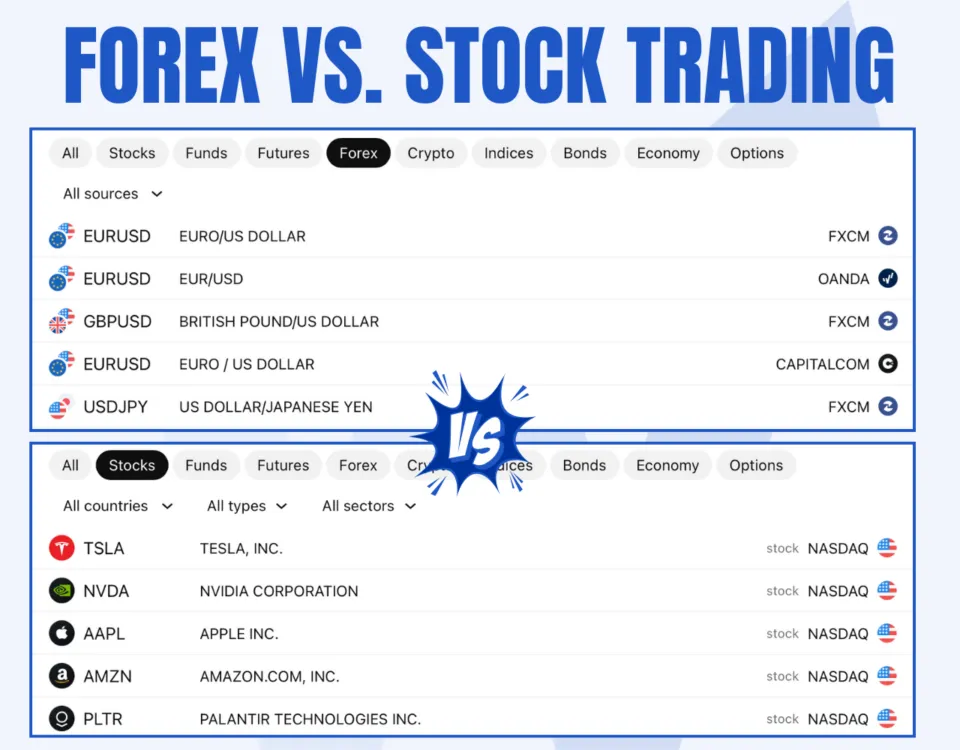
Forex vs. Stocks Trading: Key Facts
| Specification | Stocks | Forex |
|---|---|---|
| 1. Market Type | Centralized Exchanges – Trading is centralized in exchanges, such as the New York Stock Exchange. | Decentralized Market – Operates via OTC with no centralized exchange. |
| 2. Instruments Traded | Shares of individual publicly traded companies (e.g., Apple, Google) | All currency pairs from various countries worldwide. |
| 3. Trading Hours | Dependent on the specific stock exchange | Open 24 hours from Mondays to Fridays and closed on weekends. |
| 4. Ownership | Yes; buying a share makes you a part-owner of the company | Temporary ownership of the currency while the trade is active |
| 5. Dividend Eligibility | Eligible for dividends declared by the company | No dividend |
| 6. Liquidity | Less liquid than Forex; varies greatly depending on the stock | Highly liquid as Forex is the largest financial market in the world. |
| 7. Minimum Investment | Varies on the broker; some allow fractional shares | Depending on the broker, the minimum can be as little as $1 |
| 8. Brokers | Notable brokers include Interactive Brokers, Fidelity, Charles Schwab, TD Ameritrade, etc. | Notable brokers include Interactive Brokers, XTB, XM, Forex.com, etc. |
| 9. Trading Platforms | MetaTrader 5, ThinkorSwim, Interactive Brokers TWS, Robinhood, NinjaTrader, etc. | MetaTrader 4 (MT4), MetaTrader 5 (MT5), cTrader, TradingView, and other broker-provided platforms |
| 10. Leverage | Much lower than forex; usually only up to 5:1 (depending on the country’s stock market regulation) | Much higher leverage compared to stocks (can go as high as 100:1 or more, depending on the broker) |
| 11. Risk Factors | Driven primarily by company- and sector-specific risks | Driven primarily by market volatility (rapid price movement) |
| 12. Profit Potential | Lower profit potential due to much lower available leverage compared to forex | Provides higher profit potential due to access to higher leverage |
| 13. Regulation | Much highly regulated; specific regulation depends on the country where the stock exchange is located | Being decentralized, it is generally less regulated as specific regulation varies by country and/or region |
| 14. Trading Cost | – Commissions, spreads, SEC fees, and exchange fees | – Low commissions (most brokers offer commission-free trading)- Spread-based pricing (difference between bid and ask price) |
| 15. Fractional Trading | Available with many stock brokers | Not available; forex is traded in standard lots |
(Never Trade In Uncertainty Again – Join The WR Trading Mentorship)
What is the Forex Market?
The foreign exchange (forex) market is the global, decentralised marketplace where currencies are actively traded (i.e., bought and sold). Furthermore, it is the world’s largest and most liquid financial market, with an average daily trading volume exceeding $7 trillion.
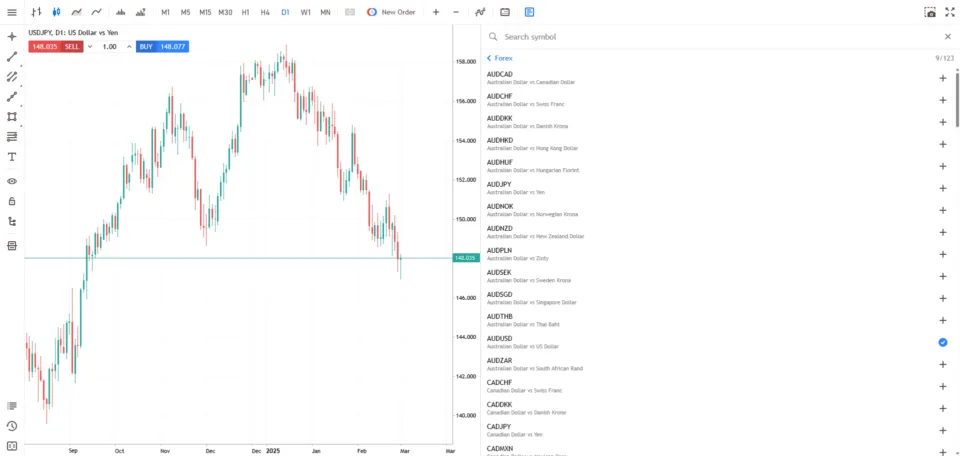
What is the Stock Market?
The “stock market” refers to the marketplace where publicly traded companies are bought and sold. It serves as a platform for companies to raise capital and for investors to buy ownership stakes in public companies, with the potential for profit through capital appreciation and dividends. A stock (also called a “share” or a “share of stock”) represents ownership in a company. Therefore, stock trading is the act of buying and selling (or exchanging) ownership stakes in individual companies.
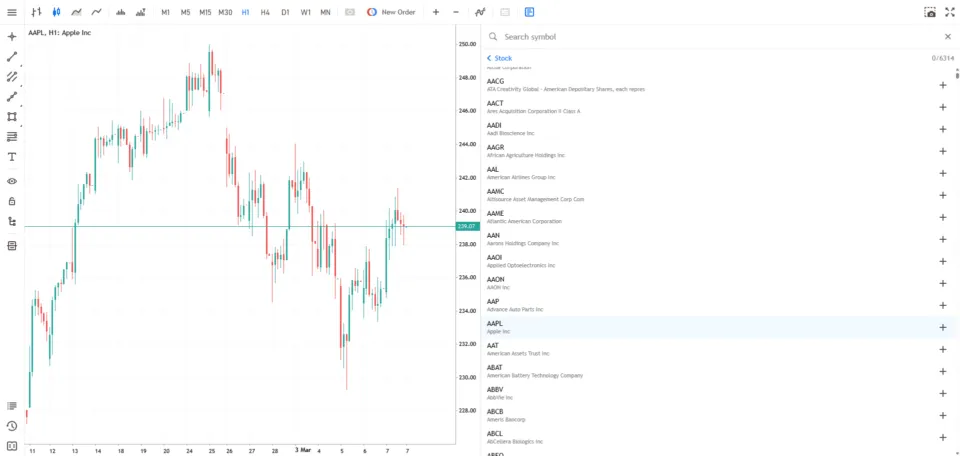
Is Forex trading riskier than stock trading?
In general, forex is widely considered riskier. This is mainly due to the fact that forex allows for significantly higher leverage than stocks. For instance, in the US, the maximum leverage mandated by the SEC is only 2:1, and across different stock markets globally, the highest leverage is typically around 5:1.
On the other hand, since forex is decentralized, you can often access leverage of 100:1 or even much higher, depending on the broker. These extremely high levels of leverage amplify the risk in forex, as even a small price movement can lead to significant losses.
What are the similarities between Forex and Stock trading?
Here are the three notable similarities between Forex and Stocks:
1. Bid-Ask Spread – Both the stock market and forex have a bid-ask spread system, which represents the difference between the buying and selling price.
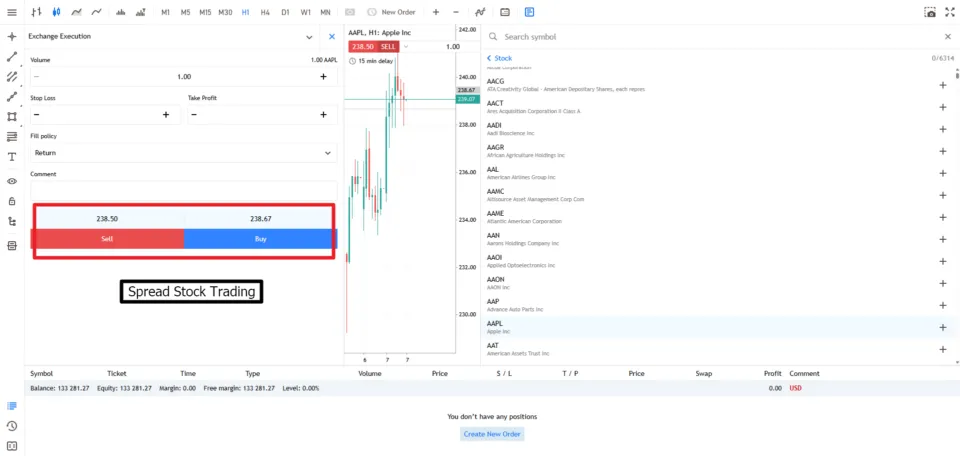
2. Leverage Availability – Both the stock market and Forex offer leverage, albeit at different levels.
3. Volatility Level – Both markets typically experience high volatility, especially during major macroeconomic announcements (particularly inflation, GDP, and interest rate adjustments).
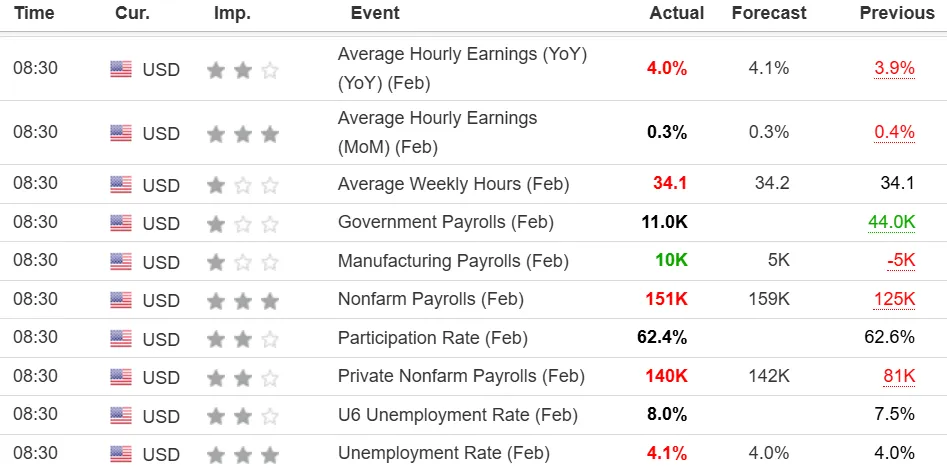
Pros and Cons of Forex Trading
Here are the key pros and cons of Forex trading compared with stock trading:
Pros
- No Short-Selling Restrictions
- Ability to Focus on Fewer Pairs
- Much Higher Leverage Access
- Higher Liquidity Than Stocks
- More Accessible Trading Hours
Cons
- No Ownership
- No Dividend Issuance
- No Centralized Regulation
- Potential Risk of Being Overleverage
- Much Higher Volatility
Pros of Forex Trading
Forex does not have restrictions on which pairs you can short. In contrast, there are usually notable short-selling restrictions in the stock market. Because you can take opposing positions freely (i.e., either going long or short), you can focus on a handful of currency pairs. In contrast, trading stocks typically requires a much more diversified position.
Compared with stocks, Forex allows significantly higher leverage (even above 100:1, depending on the broker). In contrast,stocks typically allow leverage of around 2:1 to 5:1, depending on the country. As the largest financial market, the Forex market is also the most liquid, even compared to stocks. The forex market is open 24 hours from Monday to Friday. In contrast, stock market operating hours vary by country.
Cons of Forex Trading
Unlike the stock market, where buying a stock makes you a part-owner of a company, trading currency pairs does not grant you any ownership stake. Unlike buying certain stocks, which can grant rights to dividends and serve as a source of passive income, the Forex market offers no such opportunity.
Compared to the stock market, which has centralized exchanges (e.g., NYSE, NASDAQ), Forex is decentralized, and the regulations vary greatly per region and country. While access to more leverage can be a benefit, it also exposes many traders, especially beginners, to significant losses. Due to being the most liquid financial market, volatility in Forex is also often the highest, particularly during key macro events.
(Never Trade In Uncertainty Again – Join The WR Trading Mentorship)
Pros and Cons of Stock Trading
Here are the key pros and cons of stock trading compared with Forex trading:
Pros
- Potential for Long-Term Appreciation
- Potential for Dividend Income
- Availability of Passive Investing
- Lower Risk from Over-leverage
- Regulated Market
Cons
- Short-Selling Restrictions
- Company and Sector-Specific Risks
- Lower Access to Leverage
- Limited Trading Hours
- Prone to Economic Downturns
Forex trading not only has various advantages and disadvantages, but stocks also have pros and cons that need to be weighed up.
Pros of Stock Trading
Unlike Forex, you can invest in the stock market and let it compound over years or even decades. This makes it a viable long-term investment vehicle. In the stock market, you can buy dividend-paying stocks, which provide passive income simply by holding them.
Unlike Forex, you can invest passively in Exchange-Traded Funds (ETFs), which are baskets representing a sector or an index. While stocks offer much lower leverage than Forex (5:1 vs. 100:1 or higher), this also inherently limits the risk that comes from being over-leveraged.
Since stock trading occurs on centralized exchanges, it provides greater transparency and reduces the risk of broker-driven price manipulation.
Cons of Stock Trading
Depending on the stock exchange, there are often short-selling restrictions based on the specific stock or sector. Trading stocks exposes you to the underlying risks of the company and the sector or industry to which it belongs.
For some traders, a maximum leverage of 5:1 per trade (or even lower on some stock exchanges) may feel too limited. The stock market has relatively limited trading hours, as they depend on the specific stock exchange. This makes it less flexible than Forex, which operates 24 hours a day, five days a week.
Due to short-selling restrictions, the stock market is more susceptible to economic downturns, as you may not always have access to short a stock during these periods.
Conclusion
Overall, the choice between stocks or forex depends on your risk tolerance and unique goals. If you prefer long-term capital appreciation, investing in stocks may be the better choice, as it offers ownership in individual companies and the possibility of consistent passive income through dividends. On the other hand, if you seek maximum short-term profit potential and the ability to trade around the clock, Forex trading might be more suitable, as it offers a more flexible trading environment and unmatched access to leverage.
Learn Forex and Stock Trading With WR Trading
If you want to level up your understanding of either stock or forex trading, including learning specialized concepts as well as tried-and-tested trading strategies and risk management systems, we recommend you check out our additional resources at https://wrtrading.com/.
(Never Trade In Uncertainty Again – Join The WR Trading Mentorship)
Frequently Asked Questions on Forex vs Stock Trading
Which market is more volatile?
While both markets are highly volatile compared to other financial markets, Forex tends to be relatively less volatile due to its high liquidity, particularly in major currency pairs. In contrast, individual stocks, especially low-volume penny stocks, can experience extreme volatility due to their low liquidity and susceptibility to large price swings.
Is Forex trading riskier than stock trading?
Forex is generally considered riskier primarily because it allows for significantly higher leverage than stocks. Across global stock markets, the highest leverage is typically around 5:1. In contrast, Forex traders can often access leverage of 100:1 or even higher. This high leverage significantly amplifies the risk of incurring massive losses.
Which is better for beginners?
While both can be good starting points, stock trading is generally more straightforward and imposes natural trading limits due to market hours and lower leverage. Forex, on the other hand, operates 24 hours a day, five days a week, and can encourage overtrading due to its continuous availability. Not to mention, the allure of high leverage can be tempting.
Which is better for long-term investing?
For long-term investing, the stock market offers a far better platform than Forex. Unlike Forex, you can invest in stocks and let them compound over years or even decades, making it a viable long-term investment vehicle. Additionally, you can just simply invest passively in Exchange-Traded Funds (ETFs), which represent a specific sector or a stock index as a whole.
Which is better for day trading?
While both can be used for day trading, in most cases, Forex is generally better suited for scalping and intraday trading due to its 24-hour availability, much higher liquidity (especially in major currency pairs), and tighter spreads.


